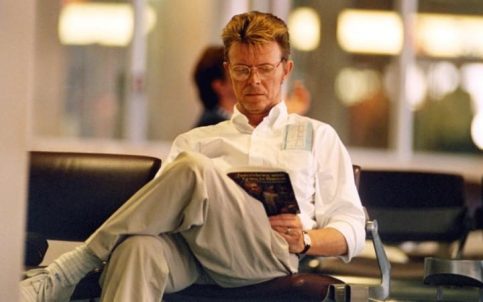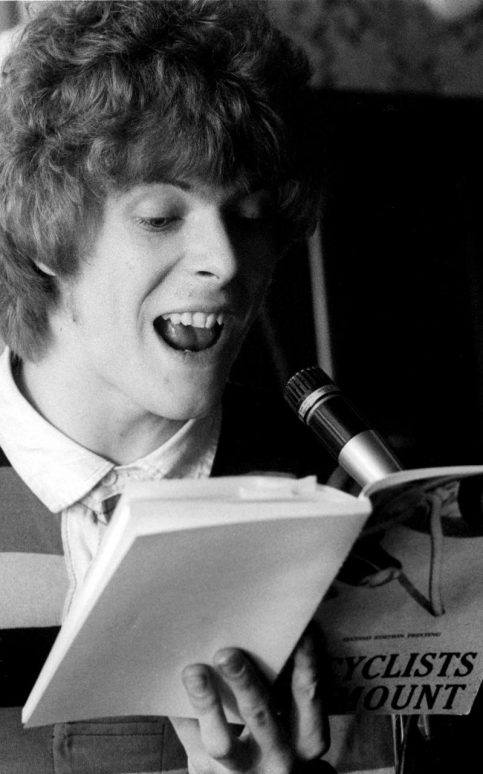For a man who left Bromley Technical High School with just one ‘O’ level (in art), David Bowie ended up a remarkably well-read man.
Bowie, who died aged 69 on January 10 2016, said that “when I’m relaxed what I do is read” and described a good week as one in which he pored through “three or four books”.
Bowie was witty and knowing about his own acquisitiveness for books and first editions. He paid tribute to his parents for passing on a love of literature. One of the turning points of his life was reading Allen Ginsberg and Jack Kerouac; he said that reading On The Road at 15 was an epiphanous moment, giving him the urge to get out of Bromley.
Bowie took 400 books with him to Mexico to the shoot of 1976 film The Man Who To Earth. He told Mr Showbiz in 1997: “I was dead scared of leaving them in New York, because I was knocking around with some dodgy people and I didn’t want them nicking any of my books.”
That set a pattern of taking a travelling library on tour and Bowie said: “I had these cabinets – it was a travelling library – and they were rather like the boxes that amplifiers get packed up in. . . because of that period, I have an extraordinarily good collection of books.”

During his career, Bowie talked about the books and writers he liked, everything from Allan Ginsberg and William Burroughs, to Stephen King (“I love Stephen King, scares the s— out of me”). He retained an interest in British authors: Martin Amis (“funny”); Peter Ackroyd (“there’s a great mysticism in his work. I’ve read everything he’s ever written. That disquieting underbelly that he sees in London, that’s how I perceive it too.”); Julian Barnes (“I really like him, it’s another world”) but said he had problems with Thomas Hardy. “There’s a resonance in Thomas Hardy that I appreciate but I still find it hard work,” said Bowie.
One of the few times he expressed a negative opinion was about Anita Brookner’s Hotel du Lac, telling Ikon in 1995 that the 1984 Booker Prize-winning novel was “something I just can’t use, it doesn’t apply”.
Bowie’s tastes were eclectic but impressive. He was also a fan of the cult comic novel A Confederacy of Dunces by John Kennedy Toole and Spike Milligan’s Puckoon.

And thanks to an exhibition of Bowie at the Running at the Art Gallery in Toronto, Ontario, we have a list from co-curator Geoffrey Marsh of Bowie’s 100 favourite books.
David Bowie’s Top 100 books
- The Age of American Unreason, Susan Jacoby, 2008
- The Brief Wondrous Life of Oscar Wao, Junot Díaz, 2007
- The Coast of Utopia (trilogy), Tom Stoppard, 2007
- Teenage: The Creation of Youth 1875-1945, Jon Savage, 2007
- Fingersmith, Sarah Waters, 2002
- The Trial of Henry Kissinger, Christopher Hitchens, 2001
- Mr. Wilson’s Cabinet of Wonder, Lawrence Weschler, 1997
- A People’s Tragedy: The Russian Revolution 1890-1924, Orlando Figes, 1997
- The Insult, Rupert Thomson, 1996
- Wonder Boys, Michael Chabon, 1995
- The Bird Artist, Howard Norman, 1994
- Kafka Was The Rage: A Greenwich Village Memoir, Anatole Broyard, 1993
- Beyond the Brillo Box: The Visual Arts in Post-Historical Perspective, Arthur C. Danto, 1992
- Sexual Personae: Art and Decadence from Nefertiti to Emily Dickinson, Camille Paglia, 1990
- David Bomberg, Richard Cork, 1988
- Sweet Soul Music: Rhythm and Blues and the Southern Dream of Freedom, Peter Guralnick, 1986
- The Songlines, Bruce Chatwin, 1986
- Hawksmoor, Peter Ackroyd, 1985
- Nowhere To Run: The Story of Soul Music, Gerri Hirshey, 1984
- Nights at the Circus, Angela Carter, 1984
- Money, Martin Amis, 1984
- White Noise, Don DeLillo, 1984
- Flaubert’s Parrot, Julian Barnes, 1984
- The Life and Times of Little Richard, Charles White, 1984
- A People’s History of the United States, Howard Zinn, 1980
- A Confederacy of Dunces, John Kennedy Toole, 1980
- Interviews with Francis Bacon, David Sylvester, 1980
- Darkness at Noon, Arthur Koestler, 1980
- Earthly Powers, Anthony Burgess, 1980
- Raw (a ‘graphix magazine’) 1980-91
- Viz (magazine) 1979 –
- The Gnostic Gospels, Elaine Pagels, 1979
- Metropolitan Life, Fran Lebowitz, 1978
- In Between the Sheets, Ian McEwan, 1978
- Writers at Work: The Paris Review Interviews, ed. Malcolm Cowley, 1977
- The Origin of Consciousness in the Breakdown of the Bicameral Mind, Julian Jaynes, 1976
- Tales of Beatnik Glory, Ed Sanders, 1975
- Mystery Train, Greil Marcus, 1975
- Selected Poems, Frank O’Hara, 1974
- Before the Deluge: A Portrait of Berlin in the 1920s, Otto Friedrich, 1972
- In Bluebeard’s Castle: Some Notes Towards the Re-definition of Culture, George Steiner, 1971
- Octobriana and the Russian Underground, Peter Sadecky, 1971
- The Sound of the City: The Rise of Rock and Roll, Charlie Gillete, 1970
- The Quest For Christa T, Christa Wolf, 1968
- Awopbopaloobop Alopbamboom: The Golden Age of Rock, Nik Cohn, 1968
- The Master and Margarita, Mikhail Bulgakov, 1967
- Journey into the Whirlwind, Eugenia Ginzburg, 1967
- Last Exit to Brooklyn, Hubert Selby Jr., 1966
- In Cold Blood, Truman Capote, 1965
- City of Night, John Rechy, 1965
- Herzog, Saul Bellow, 1964
- Puckoon, Spike Milligan, 1963
- The American Way of Death, Jessica Mitford, 1963
- The Sailor Who Fell From Grace With The Sea, Yukio Mishima, 1963
- The Fire Next Time, James Baldwin, 1963
- A Clockwork Orange, Anthony Burgess, 1962
- Inside the Whale and Other Essays, George Orwell, 1962
- The Prime of Miss Jean Brodie, Muriel Spark, 1961
- Private Eye (magazine) 1961 –
- On Having No Head: Zen and the Rediscovery of the Obvious, Douglas Harding, 1961
- Silence: Lectures and Writing, John Cage, 1961
- Strange People, Frank Edwards, 1961
- The Divided Self, R. D. Laing, 1960
- All The Emperor’s Horses, David Kidd, 1960
- Billy Liar, Keith Waterhouse, 1959
- The Leopard, Giuseppe Di Lampedusa, 1958
- On The Road, Jack Kerouac, 1957
- The Hidden Persuaders, Vance Packard, 1957
- Room at the Top, John Braine, 1957
- A Grave for a Dolphin, Alberto Denti di Pirajno, 1956
- The Outsider, Colin Wilson, 1956
- Lolita, Vladimir Nabokov, 1955
- Nineteen Eighty-Four, George Orwell, 1949
- The Street, Ann Petry, 1946
- Black Boy, Richard Wright, 1945

You must be logged in to post a comment Login